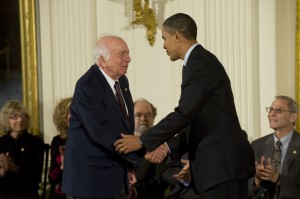A well-placed plug for the humble algorithm

The ceremony in the East Room of the White House, where President Obama bestowed the National Medal of Science on Berni Alder last October, represented the public side of the honor.
But for Alder the real action occurred after the ceremony, at a White House meeting for invited guests, politicians, family and other Washington dignitaries. At the meeting Alder bent the ear of Department of Energy Secretary Steven Chu about a particular source of consternation.
He told Chu that “people spend hundreds of millions of dollars a year on hardware and they don’t spend enough time developing algorithms to put on these machines. [Chu] totally agreed with that,” making the trip to Washington time well spent, Alder says.
Developing algorithms isn’t as glamorous as building the world’s fastest computer so it doesn’t get as much attention, Alder says. But in the history of computing, algorithm development has done as much as speeding up computers to produce scientific advances.
Alder predicts that eventually physics problems, algorithms and hardware will be integrated more fully than ever.
“When that happens, you will be able to do much more complicated hydrodynamic flow modeling. But you’ll never be able to predict the weather beyond a few days. It’s hopeless.”
About the Author
Karyn Hede is news editor of the Nature Publishing Group journal Genetics in Medicine and a correspondent for the Journal of the National Cancer Institute. Her freelance writing has appeared in Science, New Scientist, Technology Review and elsewhere. She teaches scientific writing at the University of North Carolina, Chapel Hill, where she earned advanced degrees in journalism and biology.




